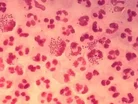Antibiotic resistant strain of gonorrhoea is discovered

A new strain of the sexually transmitted disease (STD) gonorrhoea is resistant to drugs and antibiotics, experts are warning.
It is the first time that such a strain of gonorrhoea has been identified and scientists believe the new variant of ‘the clap’, as the STD is otherwise known, could pose a global health threat.
Doctors are now calling for the development of new drugs that will be able to stop the spread of the infection.
READ MORE FROM THE WDM CONTENT NETWORK:
To read the latest edition of Healthcare Global, click here
- Peanut protein drops could cure nut allergies
- Romance novels may have negative effects on health
- Twitter used to research misconceptions about illnesses
Until now, gonorrhoea has been treatable through antibiotics but if left untreated it can cause infertility in women.
In men, the symptoms include painful urination and a pus-like discharge.
The first case of the drug resistant STD was found in Japan and details of the finding were released earlier this month in Canada at the 19th conference of the International Society for Sexually Transmitted Disease Research.
Because it is such a new finding, experts say there is no way to tell how far this strain of gonorrhoea has spread across the world.
However, they have growing concerns that it could develop quickly on a global level.
Magnus Unemo from the Swedish Reference Laboratory for Pathogenic Neisseria, said in an interview: “This is both an alarming and a predictable discovery.
“Since antibiotics became the standard treatment for gonorrhea in the 1940s, this bacterium has shown a remarkable capacity to develop resistance mechanisms to all drugs introduced to control it.
Unemo added: “While it is still too early to assess if this new strain has become widespread, the history of newly emergent resistance in the bacterium suggests that it may spread rapidly unless new drugs and effective treatment programs are developed.”



